
Three Smart Girls is a 1936 American musical comedy film directed by Henry Koster and starring Barbara Read, Nan Grey, Deanna Durbin, and Ray Milland. The film's screenplay was written by Adele Comandini and Austin Parker, and is about three sisters who travel to New York City to prevent their father from remarrying. The three plot to bring their divorced parents back together again.

One Hundred Men and a Girl is a 1937 American musical comedy film directed by Henry Koster and starring Deanna Durbin and the maestro Leopold Stokowski. Written by Charles Kenyon, Bruce Manning, and James Mulhauser from a story by Hanns Kräly, the film is about the daughter of a struggling musician who forms a symphony orchestra consisting of his unemployed friends. Through persistence, charm, and a few misunderstandings, they are able to get famed conductor Leopold Stokowski to lead them in a concert, which leads to a radio contract. One Hundred Men and a Girl was the first of two motion pictures featuring Leopold Stokowski, and is also one of the films for which Durbin is best remembered as an actress and a singer.

Henry Koster was a German-born film director. He was the husband of actress Peggy Moran.

Edna Mae Durbin, known professionally as Deanna Durbin, was a Canadian-born actress and singer, who moved to the USA with her family in infancy. She appeared in musical films in the 1930s and 1940s. With the technical skill and vocal range of a legitimate lyric soprano, she performed many styles from popular standards to operatic arias.
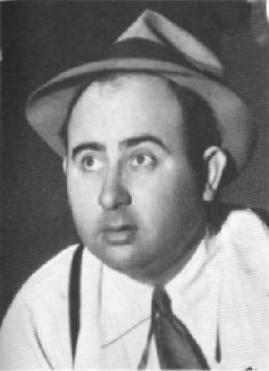
Norman Rae Taurog was an American film director and screenwriter. From 1920 to 1968, Taurog directed 180 films. At the age of 32, he received the Academy Award for Best Director for Skippy (1931). He is the second youngest person ever to win the award after Damien Chazelle, who won for La La Land in 2017. He was later nominated for Best Director for the film Boys Town (1938). He directed some of the best-known actors of the twentieth century, including his nephew Jackie Cooper, Spencer Tracy, Mickey Rooney, Judy Garland, Deanna Durbin, Fred Astaire, Gene Kelly, Deborah Kerr, Peter Lawford, Dean Martin, Jerry Lewis, and Elvis Presley. Taurog directed six Martin and Lewis films, and nine Elvis Presley films, more than any other director.

Joseph Herman Pasternak was a Hungarian-American film producer in Hollywood. Pasternak spent the Hollywood "Golden Age" of musicals at MGM Studios, producing many successful musicals with female singing stars like Deanna Durbin, Kathryn Grayson and Jane Powell, as well as swimmer/bathing beauty Esther Williams' films. He produced Judy Garland's final MGM film, Summer Stock, which was released in 1950, and some of Gene Kelly’s early breakthrough roles. Pasternak worked in the film industry for 45 years, from the later silent era until shortly past the end of the classical Hollywood cinema in the early 1960s.
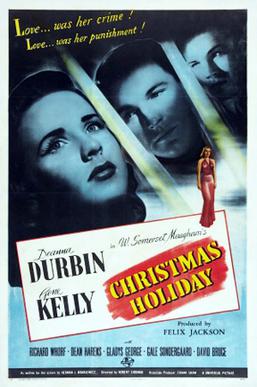
Christmas Holiday is a 1944 American film noir crime film directed by Robert Siodmak and starring Deanna Durbin and Gene Kelly. Based on the 1939 novel of the same name by W. Somerset Maugham, the film is about a woman who marries a Southern aristocrat who inherited his family's streak of violence and instability and soon drags the woman into a life of misery. After he is arrested, the woman runs away from her husband's family, changes her name, and finds work as a singer in a New Orleans dive. The film received an Academy Award nomination for Best Musical Score for Hans J. Salter.
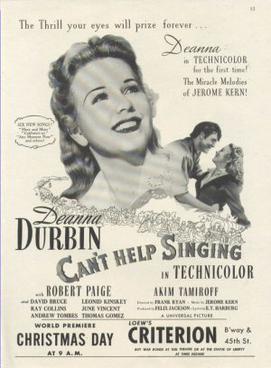
Can't Help Singing is a 1944 American musical Western film directed by Frank Ryan and starring Deanna Durbin, Robert Paige, and Akim Tamiroff. Based on a story by John D. Klorer and Leo Townsend, the film is about a senator's daughter who follows her boyfriend West in the days of the California gold rush. Durbin's only Technicolor film, Can't Help Singing was produced by Felix Jackson and scored by Jerome Kern with lyrics by E. Y. Harburg.

Gloria Jean was an American actress and singer who starred or co-starred in 26 feature films from 1939 to 1959, and made numerous radio, television, stage, and nightclub appearances. She is probably best remembered today for her appearance with W. C. Fields in the film Never Give a Sucker an Even Break (1941).
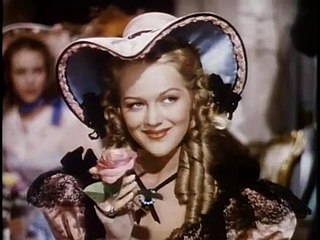
Martha O'Driscoll was an American film actress from 1937 until 1947. She retired from the screen in 1947 after marrying her second husband, Arthur I. Appleton, president of Appleton Electric Company in Chicago.

Three Smart Girls Grow Up is a 1939 American musical comedy film directed by Henry Koster, written by Felix Jackson and Bruce Manning, and starring Deanna Durbin, Nan Grey, and Helen Parrish. Durbin and Grey reprise their roles from Three Smart Girls, and Parrish replaces Barbara Read in the role of the middle sister. Durbin would reprise her role once more in Hers to Hold.

It Started with Eve is a 1941 American musical romantic comedy film directed by Henry Koster and starring Deanna Durbin, Robert Cummings, and Charles Laughton. The film received an Oscar nomination for Best Original Music Score. The film is considered by some critics to be Durbin's best film, and the last in which she worked with the producer and director who groomed her for stardom. It Started with Eve was remade in 1964 as I'd Rather Be Rich.
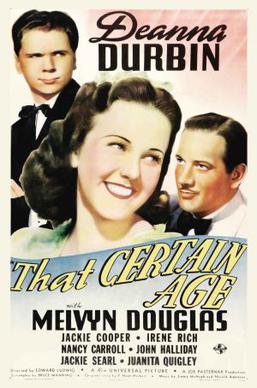
That Certain Age is a 1938 American musical film directed by Edward Ludwig and starring Deanna Durbin and Melvyn Douglas. Based on a story by Aleen Leslie (Wetstein) that was adapted by F. Hugh Herbert, the film is about a dashing reporter who returns from covering the Spanish Civil War and is invited to spend time at his publisher's home, where his adolescent daughter develops a crush on him. The family does their best to sway the young girl's feelings away from the reporter, but it is a challenge, as she is at "that certain age". Distributed by Universal Pictures, the film received Academy Award nominations for Best Music and Best Sound Recording.

First Love is a 1939 American musical film directed by Henry Koster and starring Deanna Durbin. Based on the fairy tale Cinderella, the film is about an orphan who is sent to live with her wealthy aunt and uncle after graduating from boarding school. Her life is made difficult by her snobby cousin who arranges that she stay home while the rest of the family attends a major social ball. With the help of her uncle, she makes it to the ball, where she meets and falls in love with her cousin's boyfriend. The film received Academy Award nominations for Best Art Direction, Best Cinematography, and Best Music.

It's a Date is a 1940 American musical film directed by William A. Seiter and starring Deanna Durbin, Kay Francis, and Walter Pidgeon. Based on a story by Jane Hall, Frederick Kohner, and Ralph Block, the film is about an aspiring actress who is offered the lead in a major new play, but discovers that her mother, a more experienced actress, was hoping to get the same part. Their lives are complicated further when they both get involved with the same man. Distributed by Universal Pictures, It's a Date was remade in 1950 as Nancy Goes to Rio.
Friedrich Kohner, credited professionally as Frederick Kohner, was an Austrian-born novelist and screenwriter, both in Germany and the U.S.

Nice Girl? is a 1941 American musical film directed by William A. Seiter, and starring Deanna Durbin, Franchot Tone, Walter Brennan, Robert Stack, and Robert Benchley. Based on the play Nice Girl? by Phyllis Duganne, the film is about a young girl who finds herself attracted to one of her father's business partners who comes to town to give her father a scholarship for his dietary studies.

The Amazing Mrs. Holliday is a 1943 American comedy drama film produced and directed by Bruce Manning and starring Deanna Durbin, Edmond O'Brien, and Barry Fitzgerald.
Felix Jackson was a German-born American screenwriter and film producer.
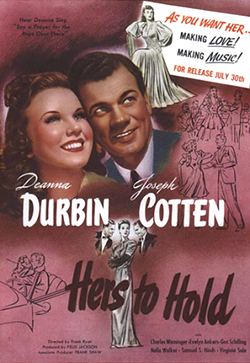
Hers to Hold is a 1943 American romantic musical comedy film and is the third film in Three Smart Girls trilogy. In Hers to Hold, Deanna Durbin reprises her role as Penny Craig, who is the only sister remaining at home.



















